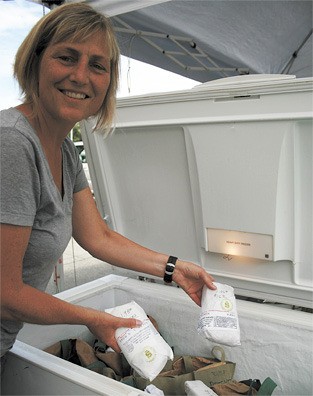Jennifer Argraves and her husband, Louis Sukovaty, are both engineers by trade. When they started their small family farm in the Methow Valley, the idea was to have a farm for themselves to feed their own family.
Now, they are full-time organic farmers at the Crown S Ranch.
The Mercer Island farmers market is the only market they participate in, due to the distance and time. The Crown S Ranch is 100 miles away as the crow flies, but it takes three and a half hours to get to Mercer Island because of the mountains.
“We are a really small family farm and so we only have time for one market,” Argraves said. “It’s just delightful working with your group..” she said of the Mercer Island market. “We can set up the system early, so we bring what’s needed to fill out the market.”
Argraves is not bringing produce, though. Crown S raises grass-fed cattle, pigs, sheep, laying hens, chickens and turkeys on its Certified Organic pastures. The farm offers CSA (community supported agriculture) shares of beef, pork, lamb, chickens and eggs.
“Our motto is better for the animal, better for the environment, better for you,” Argraves said. “We decided if we’re going to eat meat, we’re going to raise it ourselves.”
Crown S eggs come from free-range laying hens who are free to run, producing what Argraves said are eggs that are “cream of the crop.” The broiler chickens start in a brooding house, then are moved to a chicken train, a large floorless mesh enclosure that moves slowly over the certified organic pasture. The laying hens are brought into a mobile hen house at night. Both measures are taken to protect the chickens and hens from being plucked off by a predator such as an eagle or owl.
All of their fields have been certified organic by the Washington State Department of Agriculture (WSDA). Argraves and Sukovaty even grow their own organic hay for the animals, and organic grain for the chickens, pigs and turkeys.
Of course, Argraves and Sukovaty use no herbicides or pesticides, hormones or steroids, and rotate their pastures.
Following the cattle with poultry on the pastures reduces the fly count, since the birds eat the larva of flies and other pest insects. Flies that escape the chickens’ notice are controlled using non-insecticide traps that the couple builds themselves. Parasites such as liver flukes and intestinal worms are kept in check through rotational grazing, since the steers rarely graze the same pasture more than once in three weeks — a period exceeding the life cycle of the majority of these parasites.
Argraves said she and her husband have had three interns this summer and four part-time employees. Their 10-year-old daughter incubates the chickens and their 13-year-old son helps out at the farmers market.
And there is more.
The ranch even offers “Haycations,” a “farmer for the day” experience for fami lies.
Islander Jeff Newman and his wife, Carrie Wernick-Newman, and their family took a two-night Haycation at the farm.
“In some ways, it’s very old-school, the whole sustainable piece of it, but they do apply their engineering skills,” Wernick-Newman said.
Jeff Newman pointed out that hundreds of years ago, the only way people could farm was by using sustainable methods, but over the years, farmers added inputs from outside their farms.
He said the goal at Crown S Ranch is to have no net input of nutrients from outside the farm.
“They’re having to kind of reinvent the wheel,” he said.
As far as their accommodations, the couple said they were housed in a newly renovated two-bedroom cottage with a kitchen and bunk beds for the kids, who helped collect eggs in the morning.
“We didn’t work on the farm, but we certainly saw how the farm is run. They are very committed and enthusiastic about what they are doing,” Newman said.
“This is the future of farming,” Argraves noted.
To learn more, visit www.crown-s-ranch.com.



